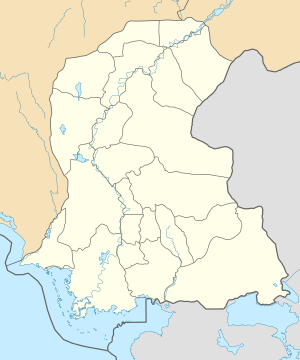Shahdadpur
| Shahdadpur شهدادپور | |
|---|---|
| City | |
 Shahdadpur | |
| Coordinates: 25°55′22″N 68°37′14″E / 25.92278°N 68.62056°ECoordinates: 25°55′22″N 68°37′14″E / 25.92278°N 68.62056°E | |
| Country | Pakistan |
| Province | Sindh |
Shahdadpur (Sindhi: شهدادپور) is a city in Sindh, a province of Pakistan.[1] The historic city of al-Mansura is situated about 19 kilometres (12 mi) south-east of Shahdadpur, one of the major cities in the Sanghar district. The shrines from the Sohni Mahiwal story are associated with Shadadpur. The shrine of Sohni is near the city; the shrine of Mahiwal is in the city centre.
The city of Shahdadpur has four union councils. It is associated with a number of famous Sindhi poets including Muhammad Dawood Bhutto "Daadan" and Shah Abdul Latif Bhittai, whose shrine is about 10 kilometres (6.2 mi) from Shahdadpur in Bhit Shah. Shahdadpur is also famous for its Police Training Centre (PTC).A famous religious scholor Agha Asad Raza ul Hussaini is also from Shahdadpur.
History
According to Dr. N.A. Baloch, the former vice-chancellor of Sindh University, Mir Shahdad Khan, son of Rasheed Khan, founded Shahdadpur during 1125-1128 AH (1713-1715). In 1116 AH (1704 AD), the younger Khan was referred to as Riffat Panah, which means "His Eminence". Mir Shahdad Khan had barren lands cultivated, and provided security for its people by reducing crime. He established a system for sharing produce between owners and farmers. He had aging canals and waterways renovated and extended, and dug new canals that helped establish the settlement.[2]
City and people
Ethnicities in Shahdadpur include Chachar, Siddiqui, Kazi, siyal, Solangi, Baloch, Bugti, Bhutto, Mughal, Unar, Bughio, Kashmiri, Rind, Laghari, Khaskheli, "Chohan", Nizamani, Talpur, Wassan, Abbasi, Soomro, Pathan, Chandio, Dal, Sand, Lakha, Abra, Detha, Khosa, Surhia, Sarhandi Pir, Sindhi, Memon, Dahri, Jamali, Brohi, Magsi, Arain, Lashari, Rajput, Syed, Khaledi Quershi Siddqui Pir Pir, Malik Zardari and many Sindhi and Punjabi communities.
Among the people living in the city, 40 percent are native Sindhi speakers; 50 percent speak Urdu and Punjabi; and the other 10 percent speak a different language. A significant number of Punjabi speakers also live in nearby villages. Although most of the inhabitants are Muslims, 30 percent are Hindus and 5 percent are Christians. The population is 455,800.
Schools and colleges
Shahdadpur is home to the following institutions of learning:
- Dar Aluloom Al Husainia,Cooperative Housing Society.
- Pak Oxford Public School, Shahdadpur
- Police Training College, Shahdadpur
- Govt. (Provl) Boys High School Shahdadpur
- Ali-Higher-Secondary-School-MT-Campus-Shahdadpur
- Dawood Academy High School Shahdadpur
- Sun Rise English Grammar School
- Areeba Mustafa Academy,Mohajir Colony.
- Z.A.K School and English Language Academy
- The City Grammar Higher Secondary School
- Memon Academy Higher Secondary School
- The Voice English Language & Coaching Center Shahdadpur
- Government Boys High School
- Government Girls High School
- Islamic Science College
- Tahir Rehman Higher Secondary School
- The Educators
- The Merit School
- Saint Sultan School
- Paragon Schools
- Government Boys Degree College
- Government Girls Degree College
- Mono-Technical College
- Five Star High School Jani Pura
- Super Computer System (SCS), Shahdadpur
- National Body Building & Fitness Gym
- Shaheed Mai Bakhtawar Primary School
- Jinnah Public School Hardaspura
- Suffa Cadet School
- Indus Public School
- Babar Public Middle School
- Civilized Public School
- ZJ English School
- Abbasi Academy
- Fatima Girls & Boys High School
Tombs & shrines
- Hazrat Baba Nagay Shah Bukhari
- Hazrat Baba Fateh Muhammad Shah
- Hazrat Baba Jout Ali Shah Bukhari
- Hazrat Baba Masoom Shah Bukhari
- Hazrat Baba Mehboob Shah Bukhari
- Hazrat Baba Saifullah Shah Bukhari
- Hazrat Baba Ashiq Shah Bukhari
- Hazrat Baba Tabay Shah Bukhari
- Hazrat Gaji Shah Bukhari
- Hazrat Baba Ashiqeen(Munna Bhai)